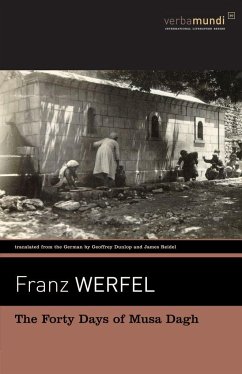The book that first drew America's attention to the Armenian Genocide, which began 100 years ago on April 24, 1915. The Forty Days of Musa Dagh is Franz Werfel's masterpiece, bringing him international acclaim and a BOMC Main Selection. First published in 1933, the chilling and riveting story takes place along the Anatolian coast in the mountain villages that chose to disobey the deportation order of the Turkish government, fearlessly repelling Turkish soldiers and police throughout the summer of 1915. Most significantly, it is the first book to deal seriously with "ethnic cleansing," an early clarion call that some heard but few heeded. This edition presents the first full English translation, with an introduction by Vartan Gregorian. In every sense, a true and thrilling novel.--The New York Times Book Review
Bitte wählen Sie Ihr Anliegen aus.
Rechnungen
Retourenschein anfordern
Bestellstatus
Storno








